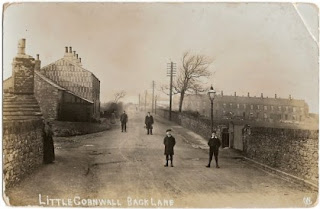Had a great time walking the streets of SW Burnley, which for me are filled with memories. The physical area I grew-up in has changed considerably and is now marked by many absences - streets and schools have fallen silent or vanished completely. Change on this scale inevitably brings memory to the fore.
Memory is about loss, but it's also about continuity, the need to knit together a sense of past and present; it's about making meanings which help to hold us together, as an individual, a family and as communities. Memory is the point where time and place merge.
SW Burnley is awash with memories. I spent time at The Orchard on Stoops Estate, a sheltered housing community, and listened to residents Irene, Joan, Ray and Mick (all great grandparents) talk about their parents and grandparents. I visited Coal Clough Library and listened to Susan talk about the libraries she worked in (some now gone). I spent the following day at Hargher Clough Community Centre, which is a repository of memories, all lovingly cherished by Chris, a community worker of 30 years. Active commemoration is an important aspect of the centre. I was struck by the banners, one made with the help of Ground Up's Cath Ford, and marking the work of local people who marched against the cuts threatening their community space. Next to this was a banner marking the death of local boy Adam Rickwood - at age 14 he was the youngest person to die in custody. This banner accompanied Adam's family and friends to the inquest into his death. The name of Margaret, Adam's grandmother, takes pride of place on the Centre's honours board.
An interest in 'the past' can often be dismissed as nostalgia - a longing for a place, idealized, imagined. Nostalgia furnishes a dream of belonging - often to a place and time more imagined than real. SW Burnley is not awash with nostalgia, quite the opposite. Memory is active, it's lived. The act of remembering can be a form of resistance - 'this happened'.
Memories are personal, local - part of oral culture and family histories. Memories are the vital currency of everyday life, treasured, stored, exchanged, passed-on, but this fabric of memory is also fragile because it often goes unrecorded.
SW Burnley is often reduced to a statistical soundbite or quick headline in national systems of recording - all negative. Thankfully, in all the conversations I've had with residents these 'headlines' were the most significant absence.
Local memory can linger, despite impositions and change to the landscape. This photo by Robert Wade shows the Shepherds Arms at the bottom of Cog Lane - although closed for years it remains a landmark, known locally as The Peeps (Peeping Toms). The name change, imposed by the brewery, never caught on.
Kelly









